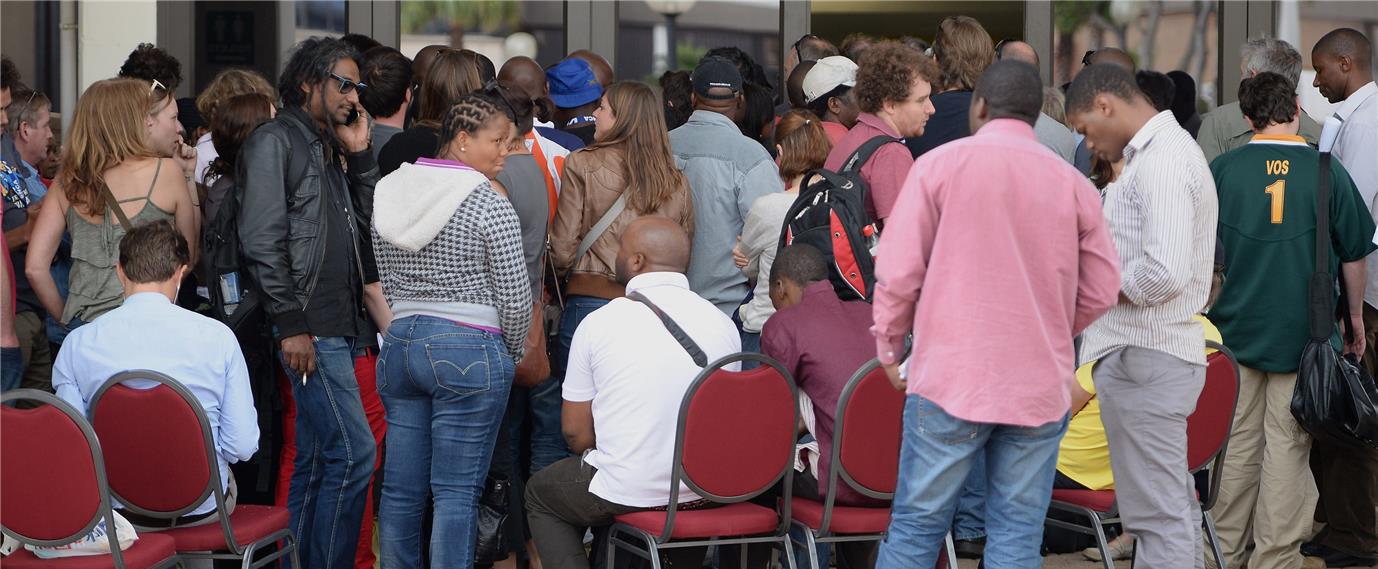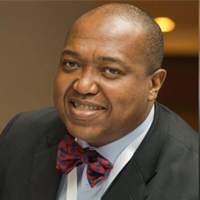يقول بين برادلي، رئيس التحرير السابق في الواشنطن بوست في مقابلة أجراها معه ستيفن ساكر في برنامج (هارد توك) على البي بي سي:"يتحدد المستوى المهني للصحفيين ومدى جودة عملهم وفق ما يُقرره أصحاب المؤسسات الإعلامية التي يعملون بها". إنّ التحدّي الأكبر في الصحافة اليوم يتمثّل في أصحاب المؤسّسات الإعلاميّة الذين يتمتّعون بالمسؤولية. فالصحفيّون مع الأسف لا يمتلكون المصادر الكافية لتمويل مؤسّسات إعلاميّة، ولذا فإنّهم مضطرّون للاعتماد على الحكومات والأثرياء لتمويل مشاريعهم الإعلاميّة الإخباريّة. وهنالك بعض الهيئات الحكوميّة وبعض المستثمرين في القطاع الخاص ليسوا مدفوعين بشكل حصريّ بالأجندات الخاصّة والمكاسب والأرباح الماليّة، بل تجدهم كذلك مهتمّين اهتماما كبيرا بالمبدأ الديمقراطي الخاص بحق النّاس في المعرفة. ولكن أمثال هؤلاء قليل، ولذا فإنّ معظم الاستثمارات في الإعلام لا تُقدّم إلا وفق شروط وإملاءات. أمّا بالنسبة لبعض الأثرياء في أفريقيا ممّن يحاولون تمويل مؤسّسات إعلامية إخبارية فهم يلاقون عناءً كبيرا كي تستمر مبادراتهم ويكتب لها النجاح. ومن يقوم بهذه المبادرات هم أشخاص يملكون شركات كبيرة لديهم القدرة لتقديم أكثر من قناة للتمويل والدعم. ولا بدّ من الإشارة هنا إلى أنّ الشّركات الإعلاميّة الإخباريّة في معظم الدول الأفريقيّة ينظر إليها على أنّها أحد أشكال المعارضة السياسية، ولذا فإنّ أي شركة تقحم نفسها في مجال الإعلام فإنّها قد تكون عرضة للإقصاء سياسيّا واقتصاديًّا. وهذا التوجّه السائد يصدّ معظم مؤسّسات الأعمال عن الدخول في قطاع الأعمال أو الاستثمار فيه.
عوائق تقنية وثقافية
تمويل مؤسّسات الإعلام الإخباريّة والاستثمار فيها ليس التحدّي الوحيد الذي يواجه الصحفيّين والعمل الإعلامي بشكل عام في تغطية الأخبار في أفريقيا. فهنالك مجموعة متنوعة من العوائق التي تحول دون تغطية أفريقيا بالشكل الأنسب، منها على سبيل المثال سرعة الإنترنت وقدرة الوصول إليه، والقوانين الصارمة المتعلقة بالعمل الإعلاميّ، والتي تجعل للثقافة والتقاليد الكلمة العليا. صحيحٌ أنّ ظهور الإنترنت قد زاد من مقدار الحريّة في بثّ ونشر الأخبار حول العالم وجعلها أقلّ تعقيدا مقارنة بما كانت عليه من قبل، إذ يمكن لأيّ شخص اليوم أن يبثّ وينشر كما يحلو له. فهنالك مثلًا تطبيق بيريسكوب (Periscope) والذي بات أحد أحدث تطبيقات الإنترنت الذي حرّر بالفعل موجات البثّ ليستخدمها جميع من يرغب بالبث. وبيريسكوب تطبيق لبث الفيديو المباشر على نظامي iOS وأندرويد، ويمكن استخدام هذا التطبيق في معظم المناطق في العالم. أمّا أفريقيا فما يزال عليها أن تواجه تحدّيات تتعلق بسرعة الإنترنت وإمكانية الوصول إليه. وتشير آخر الأرقام إلى أنّ بعض المؤشّرات القابلة للقياس، مثل عدد المشتركين في الشركات المزوّدة بالإنترنت، ومقدار الضغط في نقاط تبادل الإنترنت، وسرعات الإنترنت المتوافرة، وكل هذا يشير إلى أنّ أفريقيا متأخرة كثيرا في العالم الرقميّ."
والأمر الثاني هو أنّ معظم السياسيّين معارضون لوسائل الإعلام المستقلّة ويسعون بكلّ جهد لتقييد الحريّات الإعلاميّة في أفريقيا. إنّ للإعلام مهمّة تتعلّق بالكشف عن الفساد، وانتقاد الركود السياسيّ وضعف الخدمات المقدّمة للمواطنين في ظلّ غياب المعارضة السياسيّة الحقيقيّة في العديد من البلدان الأفريقية. ووفق مكتب منظمة العفو الدولية في غرب ووسط أفريقيا فإنّ الانتهاكات ضدَّ الحريات الإعلامية ما تزال على أشدّها. فمن غامبيا وحتّى الكاميرون يتعرّض الصحفيّون للتهديد أو النفي بسبب عملهم. وخلال السنوات القليلة الماضية قامت الحكومات القمعيّة في المنطقة بإقرار تشريعات تحدّ من حريّة التعبير. وفي ظلّ هذا كلّه كان السياسيّون يؤيّدون تلك التشريعات المقيّدة للعمل الإعلاميّ ولأولئك العاملين في هذا المجال. وقد كان يعني ذلك في العديد من الحالات تعرّض العديد من الصحفيين للقتل والاعتقال. وهكذا بات الصحفيّون مضطرّين للالتزام بتعليمات مجحفة وصارمة في العمل الإعلامي تتطلّب منهم في بعض الحالات تقديم اعتمادٍ لمؤهّلاتهم من بعض الهيئات الحكوميّة، والحصول على إثبات تفويض من مؤسّسة إعلاميّة معتمدة ودفع رسوم كبيرة للحصول على الاعتماد. وفي حال عدم التقيّد بأحد هذه المتطلّبات والشروط فإنّ الصحفي يكون عرضة للاعتقال والعقوبة. فليس من المستغرب إذًا أن تنتشر بين الصحفيين في أفريقيا ثقافة الرقابة الذاتيّة، وذلك لأنّهم يخشون أن تُسحب منهم رخصة العمل وخسارة لقمة عيشهم. ولذلك فإنّ الصحافة الاستقصائيّة الحقيقيّة قد ماتت في العديد من الدول في أفريقيا. وفي هذه الظروف تراجع عدد الصحفيين المستقلّين وتزامن ذلك مع ازدياد عدد الصحفيين الموالين للحكومة. بالإضافة إلى ذلك فإنّ القوانين الصارمة تحدّ كذلك من أعداد الصحفيّين الأجانب الذين يعملون في أفريقيا، وهكذا فإنّ معظم القصص الصحفيّة المهمّة التي تتطلّب اهتماما عالميا تمضي هكذا بلا تغطية. أمّا المؤسسات الإعلاميّة الوحيدة التي يتاح لها العمل هناك فهي تلك المؤسّسات الضخمة كالأسوشيتد برس ورويترز وأمثالها. والواقع المؤسف هو أنّ الأخبار التي يكون مصدرها الوكالات تشجّع على الصحافة الكسولة. فالأخبار تجمّع في غرفة أخبار بعيدة دون أن يكون هنالك صحفيّون في الميدان لجمع المعلومات المهمّة حول القصّة، وهذا يؤديّ إلى الوقوع في الخلط وعدم الدقّة في معظم الحالات.
ومن جانب ثالث، تشكل الثقافة والتقاليد تحدّيان من التحدّيات الكبيرة أمام تغطية الأخبار في أفريقيا. فعلى سبيل المثال، حين تعرّض نيلسون مانديلا للمرض شعرت العديد من المؤسّسات الإعلاميّة في جنوب أفريقيا بضرورة البدء بالتحضير لاحتماليّة وفاته. ومع الأسف، فإنّ هذه هي الطريقة التي تعمل بها الأخبار، ولاسيّما الأخبار التلفزيونيّة، فالتخطيط في الإنتاج التلفزيونيّ من أهمّ الجوانب التي تضمن سير العمل فيه بسلاسة. ولكنّ التّحدي الأكبر كان يتعلّق بإقناع العائلة والحكومة بأهمّية التخطيط لترتيبات جنازة الرئيس. ولكنّ الحكومة والعائلة رفضتا ذلك الاقتراح وأبدتا غضبا شديدا حين رأتا أنّ وسائل الإعلام تريد أن تحضّر لترتيبات جنازة مانديلا وهو على قيد الحياة. وهنا تصادم العامل الثقافيّ مع الواقعيّة التي يفرضها العمل الصحفيّ. ففي حين يتمّ عادة التحضير بشكل مسبق لجنائز الشخصيات المهمة في الغرب بدون اعتراض ولا مشاكل، إلا أنّ هذا الأمر لا يزال من ضمن التابوهات التي لا يصحّ تجاوزها في أفريقيا.
"صحافة المظروف البنيّ"
تبقى هنالك بطبيعة الحال بعض التعقيدات والعوائق التقنيّة التي تحول دون الحصول على تغطية مناسبة للأخبار من أفريقيا. فمعظم الأشخاص أصحاب الخبرات التقنيّة يقيمون خارج أفريقيا، وليس من السهل أن يسافروا إليها بالسرعة المطلوبة في كلّ مرّة تطرأ قصّة صحفية عاجلة ومهمة، خاصّة إن كان الأمر يتعلّق بنقل الأخبار على التلفاز. وهكذا فإنّ هبوط الصحفيين الأجانب بالمظلّيات إلى أفريقيا حين تكون هنالك أخبار عاجلة يشكّل تحدّيا كبيرا. فهؤلاء الصحفيّون، لأسباب عديدة ينتهي بهم الأمر ضحايا لما يقيمونه من تواصل مع الآخرين والخبرة التي لديهم حين يتعلّق الأمر بتغطية الأخبار في أفريقيا. فهم يركّزون على القصص السلبيّة بينما يتجاهلون القصص الإيجابيّة، أو يهملونها في أحسن حال ويضعونها في الصفحات الأخيرة من النشرات والصحف. وليس المقصود من ذكر هذا الأمر بالتأكيد أن يتجاهل الصحفيّون القصص الإخبارية السلبيّة، ولكن عليهم كذلك مواجهة التوجّه السائد في صناعة الأخبار والذي يرى أنّ الأخبار السلبيّة والصادمة هي التي تثير اهتمام المشاهدين والقرّاء. فالصحفيّون الأجانب يجمعون معظم أخبارهم من وكالات الإغاثة الدوليّة والبعثات التبشيريّة والمنظمات الدوليّة غير الحكوميّة. هذه المؤسّسات لديها ذكاء في التعامل مع الإعلام وتحضّر دائما بيانات صحفيّة عن نشاطاتها اليوميّة. ولأنّ طبيعة عمل مثل هذه المؤسّسات يتعلّق بالظواهر السلبيّة الحاصلة في أفريقيا فإنّ ما يصفونه ويتحدّثون عنه يصبح هو القصة الأفريقية بشكل حصري. ولا بدّ أن نذكر في النهاية أنّ هنالك العديد من المواقف التي عرض فيها على صحفيين في أفريقيا رشاوى مقابل تجاهل أو "تلميع" صورة بعض السياسيين فيما بات ظاهرة تعرف باسم "صحافة المظروف البنيّ" كناية عن الأموال التي يتقاضاها بعض الصحفيين على سبيل الرشوة. هذا هو واقع تغطية الأخبار في أفريقيا، فإن استمرّ الأمر على هذه الحال ولم تتم إزالة هذه العوائق وتحسين هذه الظروف فإنّ صورة أفريقيا في الأخبار ستبقى صورة القارّة المعدومة التي فقدت الأمل.








































